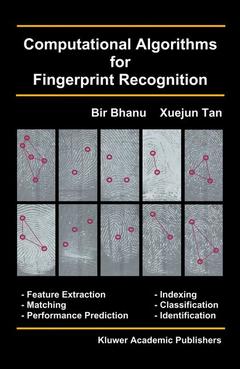Description
Computational Algorithms for Fingerprint Recognition, 2004
International Series on Biometrics Series, Vol. 1
Language: English
Subject for Computational Algorithms for Fingerprint Recognition:
Publication date: 12-2012
191 p. · 15.5x23.5 cm · Paperback
Publication date: 11-2003
Support: Print on demand
Description
/li>Contents
/li>Comment
/li>
Biometrics such as fingerprint, face, gait, iris, voice and signature, recognizes one's identity using his/her physiological or behavioral characteristics. Among these biometric signs, fingerprint has been researched the longest period of time, and shows the most promising future in real-world applications. However, because of the complex distortions among the different impressions of the same finger, fingerprint recognition is still a challenging problem.
Computational Algorithms for Fingerprint Recognition presents an entire range of novel computational algorithms for fingerprint recognition. These include feature extraction, indexing, matching, classification, and performance prediction/validation methods, which have been compared with state-of-art algorithms and found to be effective and efficient on real-world data. All the algorithms have been evaluated on NIST-4 database from National Institute of Standards and Technology (NIST). Specific algorithms addressed include:
-Learned template based minutiae extraction algorithm,
-Triplets of minutiae based fingerprint indexing algorithm,
-Genetic algorithm based fingerprint matching algorithm,
-Genetic programming based feature learning algorithm for fingerprint classification,
-Comparison of classification and indexing based approaches for identification,
-Fundamental fingerprint matching performance prediction analysis and its validation.
Computational Algorithms for Fingerprint Recognition is designed for a professional audience composed of researchers and practitioners in industry. This book is also suitable as a secondary text for graduate-level students in computer science and engineering.
These books may interest you

Deep Learning for Biometrics 179.34 €

Deep Learning for Biometrics 179.34 €

